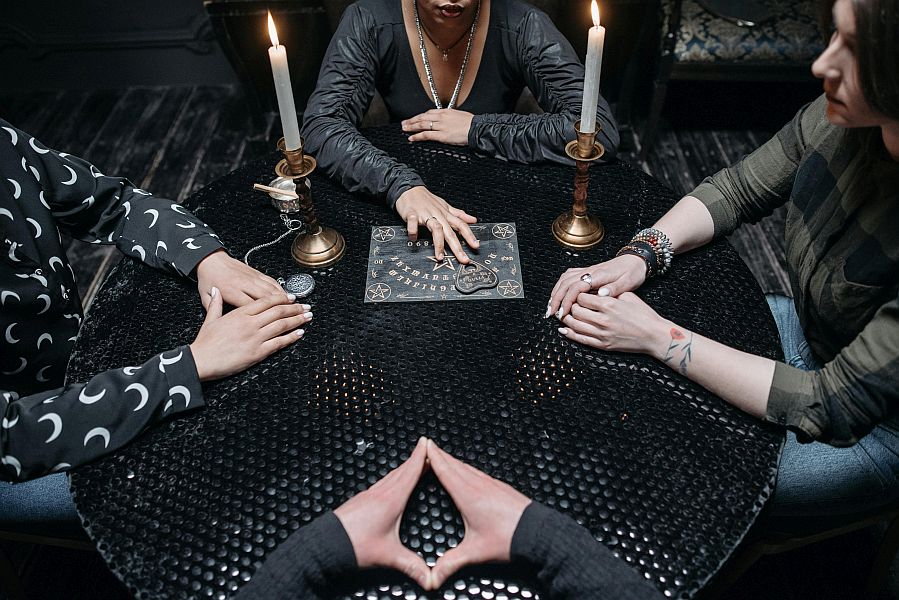Death has always been surrounded by mystery, and through the ages, people have created superstitions to explain what happens when someone passes on. These beliefs can provide comfort, offer warnings, or serve as rituals to help the living deal with the loss. Whether it’s about helping the soul move on or avoiding bad luck, here are seven intriguing superstitions about death from around the world.
Covering Mirrors After Someone Dies
Many cultures have the tradition of covering mirrors after a person dies, with the belief that mirrors are windows to the spirit world. Uncovered mirrors might trap the soul of the deceased or invite bad luck for those still living.
– Jewish Custom: During the mourning period known as shiva, Jewish families often cover all mirrors in the home. This is partly to encourage mourners to focus inward rather than on physical appearance and also to prevent any spiritual mishap.
– Southern U.S. Tradition: In the American South, some people believe that covering mirrors helps prevent the spirit of the deceased from staying in the home, which could cause bad luck.
Interesting Tidbit: The idea of mirrors as portals goes back thousands of years, even to ancient cultures like the Greeks, who believed that mirrors could hold a piece of your soul.
Hearing Three Knocks as a Death Omen
In certain cultures, especially in the UK, Ireland, and parts of Scandinavia, hearing three mysterious knocks is considered a bad sign—usually a warning that death is near. These knocks are thought to be a message from the spirit world.
– Celtic Folklore: In Irish and Scottish traditions, unexplained knocks were believed to be a signal from the supernatural, often preceding a death in the family.
– Nordic Mythology: In Scandinavian countries, three knocks are seen as a harbinger of death, representing the end of someone’s time on Earth.
Interesting Fact: The number three is significant in many traditions because it symbolizes completeness, which might explain why three knocks are linked to finality and death.
Opening Windows When Someone Passes Away
 In several parts of Europe and North America, people open windows after a death to give the soul a clear path to exit the home. This tradition is based on the belief that the spirit of the deceased needs a way to leave the body and move on.
In several parts of Europe and North America, people open windows after a death to give the soul a clear path to exit the home. This tradition is based on the belief that the spirit of the deceased needs a way to leave the body and move on.
– German Folklore: In Germany, it’s common to open the windows in the room where someone has died to help their soul move on to the afterlife.
– 19th Century America: In the U.S., especially in rural areas during the 19th century, people opened windows after someone died to avoid trapping the spirit inside.
Interesting Fact: This tradition shares roots with ancient beliefs, like those in ancient Egypt, where ensuring the soul’s proper journey after death was of utmost importance.
Birds as Messengers of Death
Birds have long been associated with death in many cultures, particularly black birds like crows, ravens, and even owls. If one of these birds flies into a house or taps at a window, it’s often seen as an ominous sign.
– European Beliefs: In many European traditions, seeing a black bird, particularly near a home or at night, is thought to be a warning that death is imminent. Ravens, being scavengers, are frequently tied to such superstitions.
– Native American Lore: Among some Native American tribes, owls are believed to be connected with death and are seen as guides for the soul’s journey to the spirit world.
Did You Know?: Edgar Allan Poe’s poem “The Raven” popularized the idea of ravens as symbols of death in Western literature, adding to the bird’s eerie reputation.
Clocks Stopping When Someone Dies
Another superstition suggests that clocks may stop at the exact moment someone dies, marking the end of their time on Earth. This tradition is found in various cultures and is often viewed as a powerful symbol of life coming to an end.
– Victorian England: In the 19th century, it was common for families in England to stop the clocks in a home immediately after someone passed away. This act was a sign of respect and symbolized the notion that time had frozen for the deceased.
– Chinese Tradition: In China, it’s believed that stopping the clock at the time of death can help the deceased’s soul transition more smoothly into the afterlife, preventing any lingering ties to this world.
Curious Fact: The connection between time and life is universal, which is why the idea of clocks stopping has been passed down in so many cultures over the centuries.
Counting Mourners at Funerals
Some cultures believe that the number of mourners at a funeral can affect the peace of the deceased in the afterlife. An odd or unlucky number of attendees might cause unrest for the spirit, or even bring misfortune to the living.
– Russian Superstition: In Russia, it’s considered unlucky to have an even number of mourners at a funeral, as it could disturb the peace of the deceased. Odd numbers, especially three or five, are believed to bring better fortune.
– Philippines Custom: In the Philippines, the number of people who attend a funeral, as well as their attire (particularly their shoes), is thought to impact the deceased’s journey to the afterlife. Wearing certain types of shoes could bring bad luck.
Fascinating Fact: In many places, numbers carry symbolic meanings in death rituals, reflecting how deeply cultures view numerology in relation to life and death.
Holding Your Breath When Passing a Cemetery
A widely known superstition suggests that you should hold your breath when passing a cemetery. This tradition exists in various cultures and is based on the belief that spirits could enter your body if you breathe in near a graveyard.
– U.S. & UK Belief: Holding your breath while passing a cemetery is thought to protect you from any spirits lingering nearby, preventing them from attaching themselves to you or following you home.
– Hispanic Tradition: In some Hispanic cultures, it’s common to say a quick prayer or hold your breath while passing a cemetery, particularly at night, to avoid drawing the attention of wandering souls.
Interesting Fact: The idea of breath being connected to the soul comes from ancient times. In many traditions, breath is considered the essence of life, which may explain why holding your breath is seen as a way to protect yourself from spirits.
Conclusion
Death superstitions are fascinating windows into how people from different cultures try to understand and cope with the end of life. Whether they’re meant to protect the living, help guide the dead, or simply explain the unknown, these beliefs show how deeply death impacts all of us. Even in today’s rational world, these old customs still hold power, reminding us of the mysteries that death brings and our universal attempts to make sense of it.
